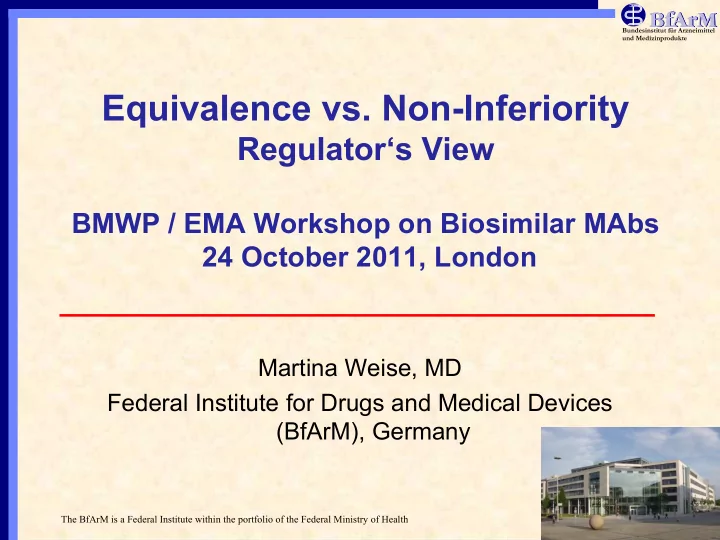

Bundesinstitut für Arzneimittel und Medizinprodukte Equivalence vs. Non-Inferiority Regulator‘s View BMWP / EMA Workshop on Biosimilar MAbs 24 October 2011, London Martina Weise, MD Federal Institute for Drugs and Medical Devices (BfArM), Germany The BfArM is a Federal Institute within the portfolio of the Federal Ministry of Health
Bundesinstitut für Arzneimittel und Medizinprodukte General Guideline: (Non)Clinical Issues Mentions „clinical comparability exercise“ and „demonstration of clinical comparability“ “Clinical comparability margins should be prespecified and justified, primarily on clinical grounds.” “Any differences …will have to be justified …” “If a clinical comparability trial design is not feasible, other designs should be explored and their use discussed with the competent authorities.” No clear advice, non-inferiority designs not categorically excluded The BfArM is a Federal Institute within the portfolio of the Federal Ministry of Health
Bundesinstitut für Arzneimittel und Medizinprodukte Product Class-Specific Guidelines Some product class-specific guidelines are more specific, requiring equivalence trials No mention of non-inferiority trials The BfArM is a Federal Institute within the portfolio of the Federal Ministry of Health
Bundesinstitut für Arzneimittel und Medizinprodukte Draft Biosimilar MAb Guideline “Normally, similar clinical efficacy should be demonstrated in …..equivalence trials.“ “It may be difficult to define appropriate equivalence margins for pharmacodynamic equivalence based on clinical relevance.“ “Equivalence margins have to be defined a priori and appropriately justified.” The BfArM is a Federal Institute within the portfolio of the Federal Ministry of Health
Bundesinstitut für Arzneimittel und Medizinprodukte WHO Guideline on Similar Biotherapeutics Equivalence trials Preferred option Advantages Confirm absence of a clinically meaningful differences Provide good rationale for extrapolation of efficacy data to other indications of the reference product Current experience is based on equivalence trials Disadvantages Larger sample size needed Finding of superiority would lead to formal failure of the study (although study may be adequate for stand-alone application) The BfArM is a Federal Institute within the portfolio of the Federal Ministry of Health
Bundesinstitut für Arzneimittel und Medizinprodukte WHO Guideline on Similar Biotherapeutics Non-inferiority trials Should be justified Advantages Smaller sample size Finding of superior efficacy would not lead to study failure Disadvantages Possibility of superior efficacy not excluded Post-hoc justification of absence of clinically relevant superiority may be difficult More difficult to extrapolate efficacy data to other indications of the reference product No experience in the “biosimilar” setting The BfArM is a Federal Institute within the portfolio of the Federal Ministry of Health
Bundesinstitut für Arzneimittel und Medizinprodukte Revision of the General Guideline Considerations – Clearer advice needed – Equivalence trials preferred but may not always be feasible or necessary (e.g. oncology trials) – Demonstration of similar physicochemical characteristics, potency and PK (PD) profiles make superior efficacy highly unlikely Personal suggestion: include wording from WHO Guideline The BfArM is a Federal Institute within the portfolio of the Federal Ministry of Health
Recommend
More recommend